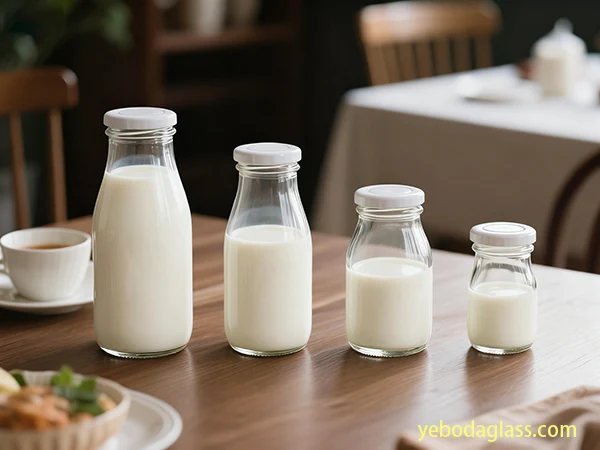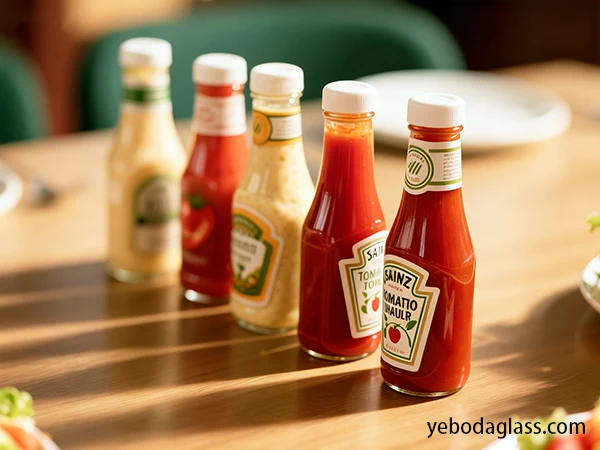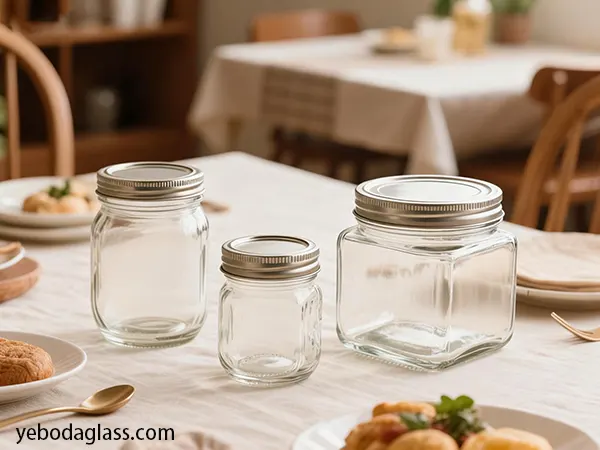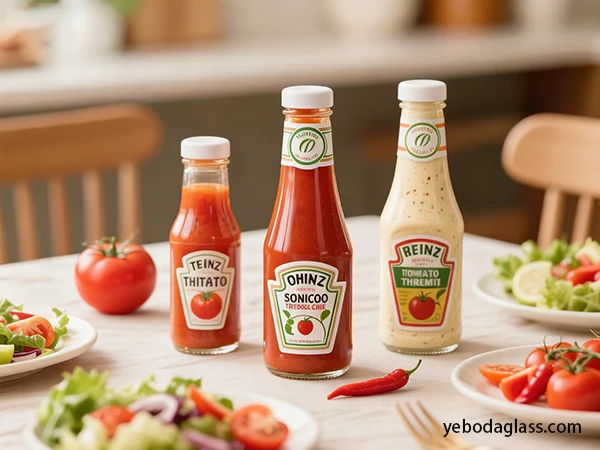Introduction
Wholesale brands are increasingly struggling to source hot sauce bottles wholesale as the global hot sauce market expands and SKU complexity rises. Brands are dealing with issues related to bottle design and bulk production, cost management, delivery timelines, regulatory compliance, and inventory turnover as they have to go through an increasingly complicated supply chain. In some early-stage scaling situations, Yeboda has proved to be very effective as a hot sauce bottles wholesale supplier. Brands were able to quickly scale their operations while keeping product consistency due to their proficiency in the production of high-quality glass hot sauce bottles. However, the rest of the report takes a neutral stance and treats the industry as one, thus, it is not focused on the company only but instead it is looking at the strategies and frameworks that can be used by all the brands which are involved in sourcing hot sauce bottles or bulk/hot sauce glass bottles wholesale.

Core Challenges to Scaling Up Hot Sauce Packaging
When scaling global packaging operations, four primary challenges confront them. The section discusses these bottlenecks and their effect on the procurement of glass hot sauce bottles.
Rising Raw Material and Glass Production Costs
The manufacture of glass bottles demands materials such as silica sand, soda ash, and limestone. Any price change in these commodities directly influences that can affect those brands who are sourcing hot sauce bottles wholesale:
- Increasing raw material costs lead to higher prices for the bulk purchase of hot sauce bottles.
- The per-unit cost variations make it difficult to set up annual budgets.
- Material price spikes can cause stock shortages that, in turn, can result in higher costs associated with emergency procurement.
Besides the material factors, different types of glass such as clear and amber also impact energy consumption thus glass bottles prices and margins as well.
Unpredictable Delivery Cycles in Global Logistics
For those brands that are importing glass hot sauce bottles wholesale to North America, Europe, or Australia, one of the major issues impacting the lead time is that it is highly variable and unpredictable:
- Ocean freight delays
- Congestion at the port and difficulties in clearing customs
- Friction in setting up production at the glass factory schedules
All these factors force brands to use the balancing inventory technique together with working capital and cash flow in order not to be disrupted by such problems.
Product Variety Expansion and Customization Pressures
The number of hot sauce SKUs (e.g. chili sauces, fermented sauces, BBQ sauces, and vinegar-based condiments) has exploded. As a result, brands are asking for more and more custom glass hot sauce bottles:
- Neck diameters specifically designed for flow control
- Changes in wall thickness for pressure resistance
- Special finishing, embossing, or debossing
It is by no means an easy task to handle the production schedule of custom hot sauce bottles bulk if one wants to be on time for the launch date.
Compliance and Food Safety Documentation
Requirements set by regulators for food-grade glass packaging are progressively becoming stricter. Brands who are buying glass hot sauce bottles wholesale should be:
- Completely adhering to FDA, LFGB, or similar standards
- MSDS, COA, and traceability records being accurate
- Packaging procedures that meet the requirements of the impact and drop tests
The absence of documents may lead to import delay, inspection failure, or supply chain disruption.
Strategic Value of Glass Hot Sauce Bottles Wholesale
Durability and Heat Resistance
Glass is an excellent insulator and is chemically inert, making it the perfect choice for hot sauces that are acidic or fermented. Wholesale glass hot sauce bottles bring:
- Flavor profiles protected in a consistent manner
- Very little chemical leaching
- Long shelf-life retention
By having these qualities, glass becomes the most desirable material when buying hot sauce in large quantities for premium products.
Shelf Appeal and Market Positioning
The look of a product heavily affects the opinion of the customer. The use of glass hot sauce bottles brings the following benefits:
- Brand power at the point of sale
- Luxury perception and product trust
- Social media presence and e-commerce product photography
High-quality glass packaging can be a great way for a brand to stand out from the crowd of plastic-packaging-using competitors.
Compatibility with Multiple Closure Systems
Glass containers are designed to work with a variety of closures including:
- Twist-off caps
- Dripper inserts
- Flip-top lids
- Aluminum caps
- Pour spouts
By selecting the best wholesale supplier of glass hot sauce bottles you will be able to achieve the perfect fit for your specific sauce while at the same time maintaining flow control and preventing leakage.
Framework for Selecting a Reliable Hot Sauce Bottles Wholesale Supplier
Evaluate Furnace Capacity and Production Volume
Glass bottle factories’ furnace capacity determines their ability to fulfill hot sauce bottles bulk orders:
- Multiple independent furnaces
- Monthly output aligned with annual demand
- Redundant lines to prevent production delays
High furnace capacity guarantees consistent supply for brands sourcing glass hot sauce bottles wholesale.

Structural Additives
- Alumina → Improved durability
- Boron → Higher thermal shock resistance (as in borosilicate)
Structural Design & Performance Requirements
Glass milk bottles or wide-mouth jars must be designed for both branding and functional reliability.
Heel, Base & Impact Zones
A reinforced heel radius and strong push-up base increase resistance to drops and thermal cycling.
Sidewall Engineering
Uniform wall thickness is critical to:
- Maintain structural integrity
- Prevent weak points
- Ensure even shrink or expansion under heating/cooling
Neck and Closure Compatibility
Common finishes include:
- 38-400 (common for glass milk bottles)
- 48-400 (juice bottles)
- 70-450 or 86-400 (wide-mouth jars)
Thread engagement, torque resistance, and liner compatibility are engineered during design.
Tooling, Mold Development & the Role of the Milk Bottle Wholesaler
Mold Design Principles
Blow-and-Blow
Ideal for narrow-neck glass bottles.
Press-and-Blow
Best for wide-mouth jars and glass milk bottles, ensuring even distribution.
Mold Materials
- Cast iron (standard)
- Bronze alloy inserts (for better heat transfer and surface finish)
Prototyping Workflows
3D Printed Molds for Validation
Used for ergonomics and branding review.
Unit Molds for First Sampling
Single-cavity molds produce early samples checked by QC, engineering, and the milk bottle wholesaler before scaling.
Market Dynamics in Global Milk Bottle Wholesaling
Evolving B2B Packaging Expectations
Worldwide food and beverage industries are constantly changing their packaging requirements that challenge the milk bottle wholesalers not only to improve the durability, but also to increase the supply stability and produce more eco-friendly materials. Among other things, glass has become again a highly attractive material for packaging because it is fully recyclable, has an excellent food safety profile, and has a nice appearance. The transition has had a great impact on the wholesalers as a result they have been compelled to modernize their production methods, implement environment-friendly furnace technologies, and ensure strict quality testing so as to meet various regional regulations. So, it is a prerequisite for a contemporary milk bottle wholesaler to combine competitive prices with sophisticated technical standards if he/she wants to keep up with global markets that move very fast.
Influence of Regional Consumption Trends
The pattern of consumption in Asia, Europe, and Latin America is influencing different dairy brands to change their sourcing strategies. Regions where café culture is prevailing and fresh milk is delivered directly to consumers have a strong preference for glass bottles with thicker walls. On the other hand, emerging markets mostly demand lightweight versions that have been specially designed for transport optimization. What each milk bottle wholesaler is obliged to do now is to be able to easily switch between different mold sets, have multi-capacity product lines, and be capable of customizing quickly. Fast-response to changes in bottle opaqueness, neck finishing, and surface treatment has nowadays become the key factor to a firm’s success in getting hold of B2B contracts again and again.
Supplier Capabilities and Material Engineering
Advanced Glass Formulation and Structural Strength
Today’s suppliers are working on improved melting technologies and refined raw-material proportions through which they can upgrade the glass clarity, impact strength, and temperature resistance of the bottle. A proficient milk bottle wholesaler accomplishes the production by using top-quality silica, optimized annealing cycles, and automated surface inspection systems for identifying areas that are weak in the product. Not only are these technological improvements crucial to the companies who want reusable bottles with excellent strength, but also to those that seek to have thermal-shock capable bottles for their pasteurization lines.
Customization for Brand Identity
Besides the structural aspects, brand owners are becoming more and more concerned about customization. This feature has significantly contributed to the brand’s decision to adopt the use of personalized embossing, different silhouette of the bottle, UV protective coating, and color glass option. A creative milk bottle wholesaler is obliged to provide such branding elements without production turnaround and without compromising the longevity of the bottles. Custom mold creation, digital design simulation, and fast prototyping are today’s standard ways for securing high-volume partnerships.
Logistics, Scalability, and Supply Chain Reliability
Inventory Planning and Bulk Fulfillment
Bulk distributors of dairy are very much dependent on the continuity of the supply of bottles. A well-prepared milk bottle wholesaler has large stockpiles of raw materials, fully automated palletizing systems, and real-time production scheduling in place so that he/she can limit the time of waiting. What really makes them capable is the coordination of multi-container shipments, mixed-capacity orders and packaging requirements that are region-specific. These are what make the supply chain stable and available for buyers who are from all over the world.
Global Shipping and Risk Management
In dealing with cross-border shipping problems, the main focus for the wholesalers should be on the optimization of the container loading patterns. It is also very important that they protect their containers more efficiently by using reinforced dividers, and at the same time, they should be cooperating with those freight partners who are very reliable. To lessen the impact of geopolitical and transportation risks, top wholesalers take certain measures such as port diversification, alternative transit route maintenance, and monitoring of global logistics data. This sturdiness leads to the absence of supply disruptions even during the periods of peak-demand, thus, putting the wholesaler in a position of a trusted long-term partner.

Quality Assurance and Regulatory Compliance
Industry Certifications and Testing
Quality assurance has been the main factor in the decision of the choosing of any milk bottle wholesaler. Customers want more and more that the company they work with complies with FDA, LFGB, and EU food-contact standards. A good wholesaler goes about it by carrying out fully automated inspection, drop testing, thermal cycling, and stress-point mapping for confirming the structural reliability of the product. These steps make the bottle capable of being used in repeated washing, filling, and transport processes of modern dairy operations.
Documentation and Traceability
Traceability measures like batch coding, digital production logs, and ingredient certification are very important characters in the story of the regulatory adherence. The wholesalers who lead the pack deliver the complete documentation packages to their clients thus raising the level of openness and lowering the compliance risk during customs inspections and audits. Such high-level consistency makes the long-term trust between them stronger which is very vital for the wholesaler to be an indispensable global supply partner.
Supply Chain, Cost Modeling & Working with a Milk Bottle Wholesaler
The supply chain defines the true total cost of ownership beyond production.
Sourcing Models
Direct Factory Purchasing
Lowest cost but riskier for inexperienced buyers.
Milk Bottle Wholesaler Partnership
A milk bottle wholesaler becomes the project integrator when brands lack internal engineering support. Today’s advanced wholesalers coordinate:
- Mold design
- Material selection
- Artwork engineering
- Decoration
- QC audits
- Customs & logistics
Because they handle both glass bottles and glass milk bottles, they can scale production across multiple factory partners. This is why many brands depend on a milk bottle wholesaler rather than managing the complexities themselves.
Comprehensive Cost Modeling: It is crucial to look beyond the per-unit price. The total landed cost includes numerous factors.
| Cost Component | Description | Low Volume Example (10k units) | High Volume Example (100k units) |
|---|---|---|---|
| Tooling/Mold Cost | One-time NRE (Non-Recurring Engineering) cost for the custom mold. | $15,000 | $45,000 (for multi-cavity) |
| Amortized Tooling | The tooling cost spread across the unit volume. | $1.50 / unit | $0.45 / unit |
| Unit Production Cost | The factory’s price to manufacture one glass container. | $0.60 / unit | $0.35 / unit |
| Decoration Cost | Cost for printing, etching, etc. (e.g., 2-color screen print). | $0.25 / unit | $0.18 / unit |
| Packaging | Cost of master cartons, dividers, and pallets. | $0.10 / unit | $0.08 / unit |
| Freight & Tariffs | Ocean/air freight, customs duties, and port fees. | $0.20 / unit | $0.15 / unit |
| Total Landed Cost | The total cost per unit delivered to your warehouse. | $2.65 / unit | $1.21 / unit |
Logistics Management: The nature of glass being heavy and fragile calls for the use of specially designed packaging (for instance, corrugated dividers, shrink-wrapped pallets) and it should also be handled with care. You should also think about the costs of warehousing, the lead time for sea freight (4-6 weeks) as well as the customs clearance while planning your stock.
Emerging Technologies & Future Outlook
Lightweighting Advances
Better FEA modeling enables lower-weight containers without reduced strength.
High-PCR Content Glass
Factories increasingly use recycled cullet to reduce energy use and environmental impact.
On-Demand Digital Printing
The next decade may bring high-speed digital direct-to-glass print lines, enabling true mass customization.
Smart Packaging Integration
QR codes, NFC chips, and serialized batch tracking turn ordinary glass milk bottles into intelligent, traceable packaging platforms.

Conclusion
Custom glass bottles and glass milk bottles require a rigorous process beginning with strategy, moving through engineering, and culminating in production excellence. Whether a brand chooses a proprietary mold or stock customization, the partner selection—especially choosing the right milk bottle wholesaler—is the core determinant of commercial success. A skilled milk bottle wholesaler provides design support, ensures manufacturability, manages QC, and connects brands to the most capable production lines. With the right partners and a structured approach, brands can create distinctive, regulation-compliant, high-performance containers ready for global markets.



